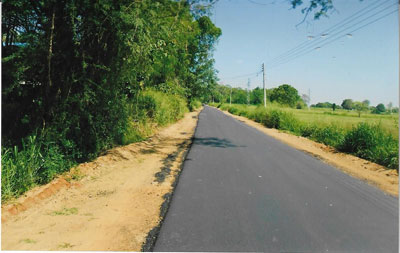New eco-friendly, road building technique by Sri Lankan engineer costs much less
An innovative technique developed by a Sri Lankan engineer to minimise costly road building especially in the country’s neglected network of roads in rural areas has seen the light of the day following successful re-building techniques.

A paved road using the new technique.
The novel thing about this new technique is that granite imported from other areas is not used in road construction as removal of granite can cause large scale environmental damage. The man behind this innovation is Gamini Wickremaratne, a mechanical engineer who started Euro Car Mart (Pvt) Ltd several years ago. In an interview with the Business Times he explained the cost effectiveness of his innovation.
He said the new method of road building was tested almost five years when he re-built the Kollukanantha road at Bandaragama that stretched up to 3.5 Km. Due to incessant rain in that area during that period the project had to be delayed, but nevertheless he was able to complete the road successfully in less than a fortnight.
The gravel road which was in a dilapidated condition had caused severe hardship to road users. The repair was delayed owing to shortage of funds the local authorities faced during that period. He said during the monsoon season the road gets eroded and the gravel base becomes muddy and impossible for road users to commute safely.
Three years following the road repair a certificate was issued to him by the authorities that the road was in a good condition. Meanwhile the California Bearing Rate (CBR) an international standard certificate used worldwide to gauge road building was issued to Road Builders New Technology, a subsidiary of Euro Car Mart (Pvt) Ltd owned by Mr. Wickremaratne.
According to Mr. Wickremaratne, the cost of construction is lower than the asphalt concreting method used in the road construction industry. The traditional method of road construction employed by the Road Development Authority (RDA) for improvement of a one km of a road by using 50 mm of asphalt compound cost more than Rs. 20 million whereas the new method used by Road Builders New Technology cost only Rs. 9.8 million almost half of the cost involved. Following the completion of the road at Bandaragama, his company was awarded the contract to rebuild the Rambewe road at Anuradapura in January this year. “Once again I had to postpone the project owing to incessant rain and due to two funerals being held at Rambewa where the road was being constructed. Dust particles flying about in the air while digging the road was an inconvenience and a hindrance to those attending the two funeral homes. But reconstruction work soon resumed and the carpeting of the road was completed within three days.”

Mr. Gamini Wickremaratne
He said the road was completed using his SSP 68 formula where water does not remain on the road but flows onto either side of the road to drains built to accommodate the flow of water. Mr. Wickremaratne cautioned using granite (kalugal) during the construction of roads. “When pieces of granite appear on the road surface during rain or when a patch of the road is broken it can damage the tyres of a car or can get flung at houses nearby causing damage or injuring the road users. This does not happen when SSP 68 formula is used,” he said.
Having completed the Rambewa road, Mr. Wickremaratne had to face another obstacle when he was asked by the local authorities that he should pay for testing of the road repair. But he insisted that the Ministry concerned has issued him with a letter that the testing charges should be borne by the local authorities and the matter was finally resolved.
Mr. Wickremaratne said his new formula SSP 68 powder for rural roads was developed with assistance from a research development engineer, the late Jayalath Jayamanne.
He said following the discovery of the formula it was brought to the notice of State Minister of Labour and Trade Union Relations Ravindra Samaraweera and the Minister of Highways and Higher Education Lakshman Kiriella. “Both ministers encouraged me to go ahead with the new road building technique. In fact the Secretary to the Ministry of Provincial Council and the Local government has forwarded a circular to all Provincial Councils to utilise this new SSP 68 cost saving method when constructing roads in rural areas. ”
Meanwhile several engineers have informed him that usage of concrete in road construction has a negative impact as concrete roads cannot withstand heat that ultimately ruptures the concrete creating gaps on roads.
“This can also happen due to inferior mixture of the compound,” he said.
The other advantage of using SSP 68 method was that roads can be opened for vehicular traffic immediately after completion and this is because the road is dug one feet-deep prior to introduce the SSP 68 compound formula. Even the Environmental Authority had said that his method was more eco-friendly as granite was not used in road construction, he said.
Asked as to why he did not register for patent rights with regard to his new invention for road building, he said he has applied for such rights and was awaiting a response. He further explained that this new method can save foreign exchange and eliminate the need to invite foreign expertise to build Sri Lankan roads.


